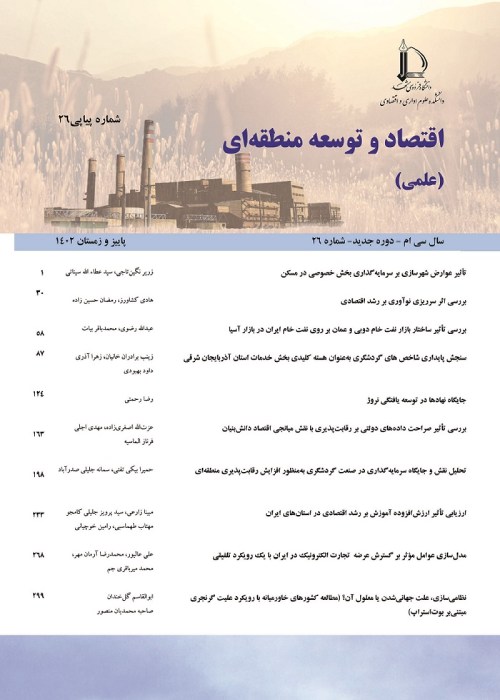Regional Integration, Knowledge- based economy and its Impact on Foreign Direct Investment (Case study: Economic Cooperation Organization (ECO) member countries)
Author(s):
Abstract:
Among possible measures taken by some countries to safeguard against the phenomenon of globalization is leaning on regional integrations. In fact concurrent with globalization efforts as well as emerging knowledge-based economy, the idea of regional integration has gained momentum in all continents. By utilizing their comparative advantages in different areas especially by strengthening institution and structures of knowledge based economy, developing countries can ward off against the ill impacts of the globalization era and use these advantages to attract more foreign direct investments and hence achieve higher rates of economic growth.
In this article an effort is made to evaluate the impact of regional integration & Knowledge based economy on boosting bilateral FDI among the ECO membership countries. We modeled the country-to-country foreign investment flows over the period from 2005 to 2013 for the Economic Cooperation Organization (ECO) by using the Gravity regression model. The sample was restricted to the 10 ECO countries for n=9 years, resulting in a N= (n*T) = 900 observations. In order to choose between random versus fixed effect specification, an Hausmann test was performed. This test highlights the strong preference for the fixed effect model. Also, we modified Wald test for groupwise heteroskedasticity in the fixed effect regression model and Durbin-Watson test for the Residual autocorrelation detection.
The results show that the sign in the basic components are similar to the existing literature. GDP of the origin as well as the destination country is significant, as predicted. Furthermore, the inverse distance has the predicted positive impact on the FDI flows.
This fact calls for further cooperation among the ECO member countries and Institutional reforms & infrastructural development for improving knowledge-based economy in attracting of bilateral FDI.
Methodology
The literature review shows how the classical Gravity Model brings good results to explain the international economic relations. Since the gravity model has physical roots, the trade & foreign investment flows depends on the market size of the origin and the destination countries as well as the distance between them. Recently by the emerging knowledge-intensive economy, several studies have highlighted that an additional effect which should be taken into consideration is the impact of knowledge & new technologies to persuade for attracting of FDI and to improve regional integration & economic relations between countries. For this phenomenon, it is asserted that if some structural changes happen in one country in a way that they affect capital flows, they will affect FDI flows of the neighbors as well, thus, producing positive effects on the volume of bilateral FDI.In this article an effort is made to evaluate the impact of regional integration & Knowledge based economy on boosting bilateral FDI among the ECO membership countries. We modeled the country-to-country foreign investment flows over the period from 2005 to 2013 for the Economic Cooperation Organization (ECO) by using the Gravity regression model. The sample was restricted to the 10 ECO countries for n=9 years, resulting in a N= (n*T) = 900 observations. In order to choose between random versus fixed effect specification, an Hausmann test was performed. This test highlights the strong preference for the fixed effect model. Also, we modified Wald test for groupwise heteroskedasticity in the fixed effect regression model and Durbin-Watson test for the Residual autocorrelation detection.
Results And Discussion
Results of the Gravity model confirm the assumption of the effectiveness of knowledge economy effects on boosting of bilateral FDI for ECO countries. In other words, there is a positive relationship between the observations of FDI & Knowledge economy for ECO member countries.The results show that the sign in the basic components are similar to the existing literature. GDP of the origin as well as the destination country is significant, as predicted. Furthermore, the inverse distance has the predicted positive impact on the FDI flows.
Conclusion
The results show a good fit of the gravity model to the related data on the bilateral FDI between ECO countries, hence, confirming the importance of the structural variables of the theoretical model and the independent variable. This results is in the confirmation of the theory relating to spillovers and locational factors. The results represent the importance of the GDP origin & destination countries, and the distance between the two countries and adjacency on FDI flow between ECO member countries. Also the results indicate that improving the KEI in host country would increase the bilateral foreign investment between the selected Islamic countries by 41 million dollar.This fact calls for further cooperation among the ECO member countries and Institutional reforms & infrastructural development for improving knowledge-based economy in attracting of bilateral FDI.
Keywords:
Language:
Persian
Published:
Journal of Economy and Regional Development, Volume:24 Issue: 13, 2017
Page:
24
magiran.com/p1757975
دانلود و مطالعه متن این مقاله با یکی از روشهای زیر امکان پذیر است:
اشتراک شخصی
با عضویت و پرداخت آنلاین حق اشتراک یکساله به مبلغ 1,390,000ريال میتوانید 70 عنوان مطلب دانلود کنید!
اشتراک سازمانی
به کتابخانه دانشگاه یا محل کار خود پیشنهاد کنید تا اشتراک سازمانی این پایگاه را برای دسترسی نامحدود همه کاربران به متن مطالب تهیه نمایند!
توجه!
- حق عضویت دریافتی صرف حمایت از نشریات عضو و نگهداری، تکمیل و توسعه مگیران میشود.
- پرداخت حق اشتراک و دانلود مقالات اجازه بازنشر آن در سایر رسانههای چاپی و دیجیتال را به کاربر نمیدهد.
In order to view content subscription is required
Personal subscription
Subscribe magiran.com for 70 € euros via PayPal and download 70 articles during a year.
Organization subscription
Please contact us to subscribe your university or library for unlimited access!


